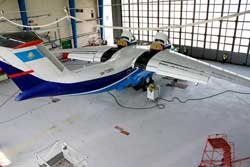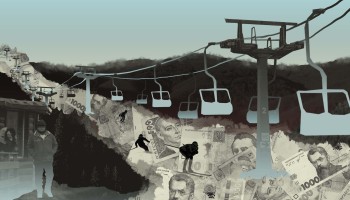Six months later, a Kazakh military court found Oleksandr Shkolyarenko, 43, a department head at Ukrspetsexport, and Oleksandr Khruliov, 42, his deputy, guilty of bribery in two separate criminal cases and sentenced them to six and a half years each in a maximum security prison.
According to the verdicts, between 2011 and 2013 the two Ukrainian officials gave nearly $1.5 million in bribes to their Kazakh counterparts in exchange for lucrative contracts to repair Kazakh military aircraft in Ukraine. The court found that the contracts awarded to Ukraine’s state-owned company were worth nearly $40 million. On one of those occasions, $500,000 in bribes landed $4 million in contracts with Ukrspetsexport to repair aircraft belonging to the Kazakh border guard service. Later one of the aircraft crashed, killing 27 people.
The July verdicts by the Kazakh court represent the first proven case of bribery by Ukraine’s state officials involved in the weapons trade that ended in jail terms. Two verdicts, both in Russian and over 30 pages long, outline the crimes committed by the Ukrainians and their Kazakh counterparts and sheds more light on the methods used by Ukrspetsexport, authorized to act as the sole intermediary that sells Ukrainian weapons on foreign markets, and how its top used bribery as a tool to win contracts.
According to the Stockholm International Peace Research Institute, in 2012 Ukraine was the world’s fourth biggest arms exporter trading, $1.3 billion worth of weapons. But not all of those trades are above board. Between 1992 and 1998 alone, $32 billion worth of heavy weapons, small arms, ammunition and other military equipment is estimated to have disappeared from Ukraine’s post-Soviet stores, according to the Organized Crime Observatory, a Swiss-based non-profit.
Ukraine’s military business with Kazakhstan mainly consists of repairing the country’s Soviet and Ukrainian produced military equipment. Last year, Ukraine also sold six rocket launchers and 260 rifles to Kazakhstan.
Present from Ukraine
The night before their arrest, the two Ukrspetsexport officials seemed to be having fun, the verdict stated. They drank five or six bottles of vodka with their Kazakh accomplice, Gen. Almaz Asenov, who would later be given an 11-year prison sentence. It was around midnight when Asenov brought the Ukrainians back to the hotel, and one of them left a package in the car, referring to it as a “present” from Ukraine.
“When Shkolyarenko got into (the) car, I had no idea what was in the package… (I) thought that he doesn’t want to leave something in the hotel, so he brought it along,” testified Asenov.
The package contained $200,000 and it was just one installment in a series of bribes that Ukrspetsexport officials regularly handed out in Kazakhstan to ensure that local military aircraft would be repaired in Ukraine, according to court records.
Neither Ukrspetsexport, nor Ukraine’s foreign ministry or Kazakh law enforcement authorities would provide any comments to OCCRP regarding the case. “Providing information on the circumstances of committing crimes by Ukraine’s citizens is subject to limitations imposed by law on protection of personal data,” reads the foreign ministry’s response.
Yet, the verdict and records from court hearings OCCRP obtained from the Kazakh Supreme Court registry provides a clearer picture of what exactly happened in Kazakhstan. As of early November, those documents had been removed from the registry.
The cash courier Antonov 72 belonging to Kazakh border guard service photographed inside a hangar of Kyiv aviation repair plant 410 in May, 2013. Kazakh court found that in 2011 the plane with the same number was repaired in Ukraine in exchange for a bribe. (Oleksii Shevchenko)
Antonov 72 belonging to Kazakh border guard service photographed inside a hangar of Kyiv aviation repair plant 410 in May, 2013. Kazakh court found that in 2011 the plane with the same number was repaired in Ukraine in exchange for a bribe. (Oleksii Shevchenko)
According to court documents, in November 2011, Asenov, who at the time headed the armaments unit of the Kazakh military, met with Shkolyarenko in Astana and offered him a deal: he would provide Ukraine with a contract to do repairs on three MiG-29 jets, and for the purchase of a rocket launcher as well as other services worth $35.1 million. In exchange, Ukrspetsexport would give him 3-5 percent of the deals’ value, or more than $1 million in kickbacks. Two days later, Shkolyarenko accepted the terms. The accomplices then decided that the kickback would be paid in installments. Over the next 14 months, the Ukrainians visited Kazakhstan four times.
On the ill-fated Jan. 25, Asenov received his penultimate installment of $200,000, with $178,000 still outstanding. The bribery scheme involved wiring money to a third party in Kazakhstan who would then convert the wired money to cash. Shkolyarenko or a representative would then arrive in the country’s capital of Astana from Ukraine where he would pick up the cash for the payment. They would call to set up a meet and the cash would be given in person.
The third party who helped the Ukrainians obtain cash in Kazakhstan, according to court records, was named Viktor Otkidych. A witness in the court case, Otkidych said that in the past he was involved in helicopter repair, and then decided to go into the food trade business. He testified that Shkolyarenko asked him to assist in converting the wired money using faked transactions into cash. Otkidych received a commission and the transactions went through his company Aldi.
He testified Shkolyarenko was first introduced to him in 2010 by Dmytro Salamatin, a Kazakhstan-born Ukrainian official.
Salamatin was appointed in 2010 to be head of Ukrspetsexport, and in February 2012 he became defense minister, a job he held until December of that year. Currently, he serves as an advisor to president Yanukovych. Salamatin didn’t respond to OCCRP’s request for comment.
The catastrophe
It appears that the bribing scandal that erupted in Kazakhstan in early this year may have contributed to or even directly led to tragic consequences.
On Dec. 25, 2012, an Antonov-72 jet belonging to the state border guard service of Kazakhstan crashed killing 27 people, including the head of the Kazakh border guard and his wife.
An investigation into the crash was still ongoing as of Nov. 22 when OCCRP spoke with the press secretary of the Kazakh chief military prosecutor over the phone.
“Three devices on board were not functioning (...) Not long before the crash the plane underwent equipment repairs at Ukrspetsexport plants, but the simultaneous breakdown of three devices in one flight means that the safety measures haven’t been met properly,” Askhat Daulbaev, Kazakhstan’s prosecutor general, said in a televised interview. “We have the facts that in this case (and a number of other airplanes) some officials received bribes from companies repairing them.”
In a Jan. 22 statement, the Kazakh Prosecutor General Office elaborated, saying the three critical items that were not functioning at the time of the crash included the plane’s autopilot function, its barometer and an altimeter, used to measure altitude.
According to court records, the bribes in these cases were delivered by Shkolyarenko and his deputy Khruliov with the help of Kazakh businessman Otkidych and two others.
On Jan. 5, Col. Kayrat Zhalbagaev, department head at the headquarters of the Kazakh border guard service, testified about how the Ukrainian side was bribing Kazakh military officials to overhaul aircraft. According to the verdict, in order to be awarded a contract to repair two Antonov-72 aircraft belonging to the border guard service, Ukrspetsexport paid more than $500,000. Along with the confession, Zhalbagaev, whose relatives died in the air crash, surrendered $40,000, which was his share of the bribe. The court sentenced him to two years in jail with a one-year suspension.
Kyiv-based civil aviation Plant 410, which specializes in repairing Antonov aircraft, didn’t respond to OCCRP’s request for comments.
On Jan. 31, shortly after the two Ukrainian officials were arrested, Kazakh Gen. Talgat Esetov, former head of Kazakh border guard headquarters, committed suicide. According to court records, in September 2010, Esetov made a deal with Ukrspetsexport to repair one of the Antonov-72s that belongs to his agency in exchange for a 15 percent kickback.
His former subordinates confirmed this in court, testifying that Esetov was entitled to nearly half of the bribe for repairing the aircraft. When the Kazakh side contracted Ukrspetsexport to repair the ill-fated aircraft, Esetov was no longer with the border guard service. Yet, the bribing was done in accordance with the same scheme Esetov used.






